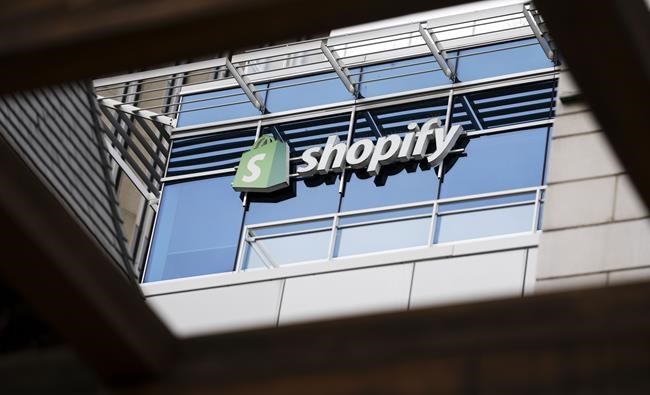Shopify Inc. is making the biggest acquisition in its history as it tries to reverse the flagging faith in its growth path that has knocked it well off the perch of Canada's most valuable company.
The e-commerce giant had already lost well over $100 billion in market capitalization in recent months before its announcement Thursday that it would buy logistics company Deliverr Inc. for US$2.1 billion pushed its stock down more than 18 per cent in morning trading.
By mid-afternoon, the losses had eased to around 14 per cent, or $86.22, to $532.08, while still leaving it at price levels not seen for the company since March 2020.
Shopify is pinning much of its hopes for a turnaround on Deliverr, which it bought to help deepen its inventory capabilities, broaden its storage and freight services and gain access to a new set of warehouses and couriers.
Deliverr, along with other automation and logistics technology, will be used to build out a network of both Shopify-owned and third-party warehouses that can deliver packages in two days or less to more than 90 per cent of the U.S., said Harley Finkelstein, Shopify's president.
"This is complicated stuff and this is stuff that is not easy to do, but that is sort of where Shopify shines," Finkelstein said, on a call with analysts.
"The goal is to make fulfilment something that our merchants, particularly in the U.S., don't have to think about."
Shopify spokesperson Stephanie Ross declined to share what the typical delivery time and volume Shopify's current network handles, but the company said Deliverr ships over a million orders per month across the U.S.
Shopify will pay about 80 per cent of the purchase price in cash and 20 per cent in shares for the San Francisco-based business.
Delivery and logistics have become increasingly important aspects of Shopify's business since the company announced it would build a network of fulfilment centres in the U.S. in 2019.
The network, which includes a self-operated and leased warehouse in Atlanta, was meant to help merchants of all sizes access new warehousing and shipping opportunities and was seen as a natural progression for the company, which already helped companies manage sales and payments.
However, the move placed Shopify more directly in competition with U.S. e-commerce goliath Amazon.com Inc.
Keeping up has proven difficult for Shopify, which has disappointed investors in recent months.
The company, which keeps its books in U.S. dollars, reported Thursday a first-quarter loss of US$1.5 billion or US$11.70 per diluted share on US$1.2 billion in revenue.
The result compared with a profit of US$1.3 billion or US$9.94 per diluted share on US$988.6 million in revenue in the same quarter last year.
On an adjusted basis, Shopify says it earned 20 cents per diluted share in its most recent quarter, compared with an adjusted profit of US$2.01 per diluted share for the first quarter of 2021.
Analysts on average had expected an adjusted profit of 68 cents per share for the quarter and US$1.25 billion in revenue, according to financial markets data firm Refinitiv.
Shopify is positioning the fulfilment network as an answer to its earnings woes, but the venture will be costly. Achieving two-day delivery will mean Shopify will need many warehouses in proximity at a time when such spaces are in high demand and often selling for a premium. The company will also have to contend with worker shortages and staff who are demanding increasing wages and more benefits.
"It takes a lot of footprint and a lot of manpower," said Mike Croza, the founder and managing principal of Supply Chain Alliance, a logistics company used by Walmart Canada, 91ԭ�� Tire and Lululemon.
"Shopify is taking this on knowing it is not an easy task, but if you have capital and good management and good plans, you can do it. It never was easy, but it's harder today."
Also making it so difficult is Amazon, he said. Few companies have Amazon's precision, discipline and sophistication, meaning any rival must match its offerings and innovate in a new way to build a customer base.
"It is totally doable but you need to be as aggressive as Amazon has been and have big pockets to expand and go in and takeover real estate and with job hiring and paying people a bit more," Croza said.
When Shopify announced its fulfilment venture in mid-2019, it intended to spend about $1 billion over the following five years.
Shopify has so far spent $117 million of that total, with some of the cash covering operating losses and capital expenditures, chief financial offer Amy Shapero said, on the same call as Finkelstein.
She anticipates Shopify will ramp up its fulfilment-related capital expenditures in 2022, with self-operated, leased warehouses in key U.S. regions opening in 2023 and 2024 being responsible for about $1 billion in such costs.
"While this requires higher upfront spend, it pays back through operating efficiencies over time and allows us to achieve our desired margin profile more effectively than solely via partners," she said.
She envisions Shopify offering one-day delivery coverage in the U.S. and enhancing return capabilities over the next three years, when she thinks fulfilment volumes will really begin to scale and Shopify will be able to handle progressively larger markets with broader needs.
This report by The 91ԭ�� Press was first published May 5, 2022.
Companies in this story: (TSX:SHOP)
Tara Deschamps, The 91ԭ�� Press


